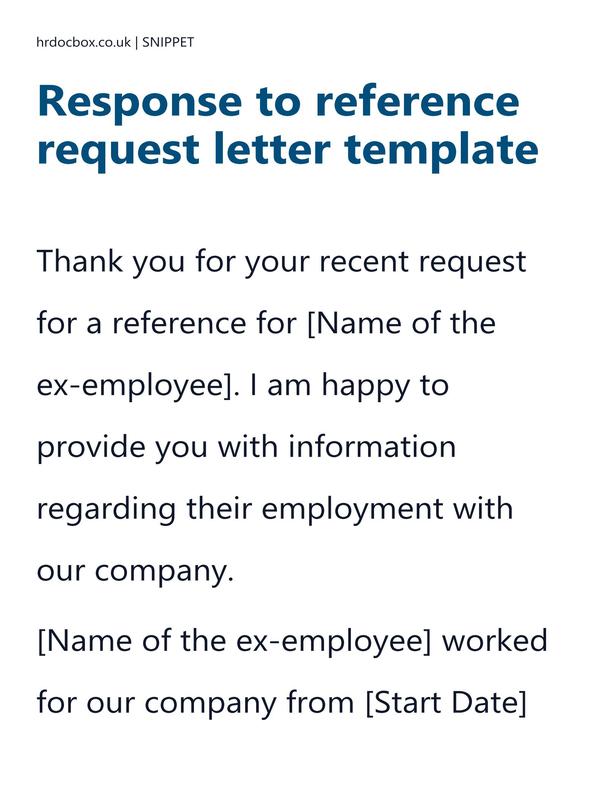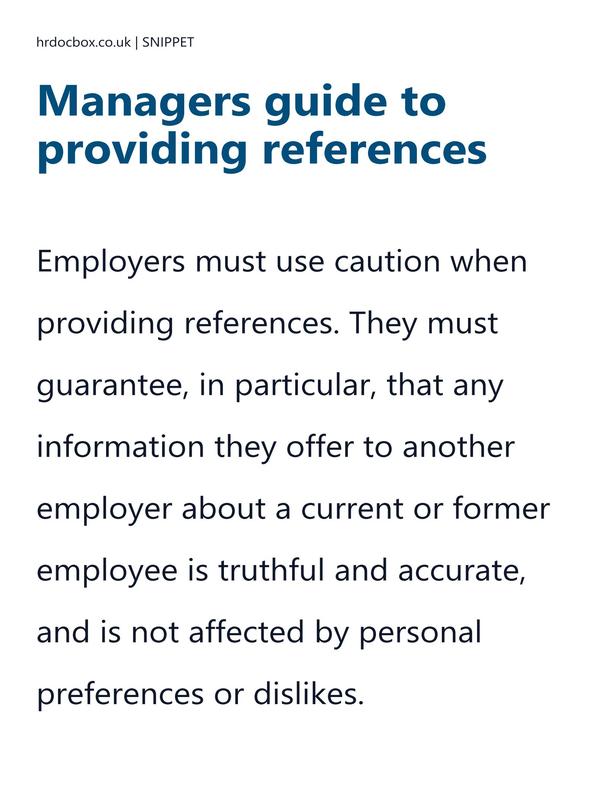Reference response templates toolkit
Our Reference Response Templates Toolkit streamlines reference responses, ensuring efficient and informative support for hiring decisions.
Our templates cover a wide range of scenarios, including requests for personal and professional references, as well as character references. Whether you're responding to a request from a former colleague, a current employee, or someone you've never met, our templates will provide you with the language you need to craft a compelling and informative response.
- Includes 12 months' access to 5 Reference Response templates, with all updates to the Reference response templates toolkit provided free of charge and notified to you.
- UK-specific accuracy.
- Instantly download templates as Word / PDF / plain text, or send by email.
- These Reference response templates toolkit will SAVE you up to 6 hours drafting & research, save you money, and reduce your risk.
Reference response
A reference response refers to the information provided by a person (usually a former employer or colleague) in response to a reference check request for a job applicant. When a candidate applies for a new job, prospective employers often contact the candidate's references to gather insights into their work history, performance, and character.
Key points about reference responses:
-
Reference Check Process: Employers typically conduct reference checks as part of their hiring process to verify the information provided by the candidate and to gain a better understanding of the candidate's suitability for the role.
-
Information Included: Reference responses may include details about the candidate's job responsibilities, skills, strengths, areas for improvement, reliability, interpersonal skills, and overall performance. Employers may also inquire about the candidate's work habits, punctuality, and ability to work in a team.
-
Confidentiality: References are usually expected to maintain a level of confidentiality when providing information about a former employee. They should refrain from sharing sensitive or personal information that is not relevant to the candidate's professional qualifications.
-
Legal Considerations: Employers need to be mindful of legal considerations when conducting reference checks. Some jurisdictions have laws regulating the type of information that can be shared about a former employee. As a result, references often provide factual and job-related information to avoid legal issues.
-
Consent: Candidates typically provide consent for reference checks as part of the job application process. This allows prospective employers to contact individuals listed as references and gather relevant information.
-
Importance in Decision-Making: Reference responses can play a crucial role in the hiring decision. They provide valuable insights into a candidate's past performance and can help employers make informed decisions about whether the candidate is a good fit for the position.
It's important for both employers and references to approach reference responses professionally, focusing on the candidate's work-related attributes and performance. Employers should be aware of and adhere to legal guidelines to ensure fair and unbiased reference checks.
Reference response templates are essential for managing a low-risk, compliant Reference response process.
Compliance
Compliance
-
Employers have a legal obligation to provide accurate and truthful references about former employees.
-
Employers should only disclose information that is relevant and necessary to the reference request.
-
Employers should obtain written consent from the former employee before disclosing their personal data to a third party.
-
Employers should be aware of discrimination laws and avoid providing references that could be discriminatory, for example, disclosing a former employee's age, disability, religion, or sexual orientation.
-
Employers should ensure that reference requests are handled consistently and impartially to avoid any allegations of discrimination or unfair treatment.
-
Employers should have a clear policy in place for handling reference requests and should train their staff on how to respond appropriately to such requests.
-
Employers should be aware of their obligations under data protection laws and ensure that any personal data disclosed in a reference is processed in accordance with these laws.
Key Reference Response Case Law
Key Reference Response Case Law
Navigating Reference response processes correctly is crucial to help you avoid any problems (which can be costly in terms of time, money and reputation).
Recent UK case law has highlighted key aspects of good Reference response management. Knowing how courts have handled claims can help you assess whether your proposed actions are likely to be seen as reasonable.
Here are some notable rulings and their implications:
-
Pnaiser v. NHS England and Coventry City Council (2016):
Facts: Ms. Pnaiser's job offer was withdrawn after her former employer, NHS England, provided a negative reference that mentioned her disability-related absences. She claimed that the reference amounted to discrimination arising from disability.
Outcome: The Employment Appeal Tribunal (EAT) found in favour of Ms. Pnaiser, ruling that the negative reference was discriminatory. The EAT held that employers must ensure that references do not discriminate based on disability or any other protected characteristic.
Key takeaway: This case highlights the importance of providing fair and non-discriminatory references.
-
Mefful v. Capita Business Services Ltd (2019):
Facts: Mr. Mefful alleged that his former employer provided an inaccurate and unfair reference, which led to the withdrawal of a job offer from a prospective employer.
Outcome: The Employment Tribunal ruled in favour of Mr. Mefful, finding that the reference was not based on factual evidence and was unfairly prejudicial.
Key takeaway: This case underscores the need for employers to provide accurate and fair references based on verifiable facts.
-
Spring v. Guardian Assurance plc (2018):
Facts: Mr. Spring claimed that his former employer provided a negligent reference, which harmed his employment prospects. He argued that the reference contained inaccurate and damaging information.
Outcome: The Court of Appeal held that an employer owes a duty of care to an employee when providing a reference. The court found that the reference was indeed negligent and that the employer was liable for the damage caused.
Key takeaway: This case reinforces the principle that employers must exercise due care and diligence when providing references.
-
Brown v. London Borough of Haringey (2020):
Facts: Ms. Brown claimed that her former employer provided a reference that was misleading and unfairly negative, which impacted her ability to secure a new job.
Outcome: The Employment Tribunal found that the reference was misleading and unfair. The tribunal emphasised that employers must ensure references are truthful, accurate, and fair.
Key takeaway: This case highlights the potential legal repercussions for employers who provide misleading or unfair references.
-
Ali v. Birmingham City Council (2021):
Facts: Mr. Ali alleged that his former employer provided a reference that unfairly portrayed his performance and conduct, resulting in the loss of a job offer from a prospective employer.
Outcome: The Employment Tribunal ruled in favour of Mr. Ali, finding that the reference was unfair and did not accurately reflect his performance. The tribunal awarded damages for the lost job opportunity.
Key takeaway: This case underscores the importance of providing references that accurately and fairly represent an employee's performance and conduct.
-
X v. Y (anonymized case) (2022):
Facts: In this anonymized case, an employee challenged a reference that included negative comments about their personality and behavior, which they claimed were not substantiated by their work performance.
Outcome: The Employment Tribunal found that the reference was unfairly prejudicial and lacked supporting evidence. The tribunal ruled that employers must base references on factual and verifiable information, avoiding subjective judgments that are not directly related to work performance.
Key takeaway: This case highlights the need for objectivity and fairness in employment references.
Instantly unlock with a purchase.
Instantly unlock with a purchase.
Reference Response workflow
Reference Response workflow
Here we show you which resources to use to effectively respond to a request for a reference, taking into account the different decisions and directions that are likely / possible.
Following this flowchart will ensure that you factor in all eventualities, follow legal / code of conduct or best practice processes, communicate effectively, and reduce the risk of things going wrong.
Frequently Asked Questions about Reference Response templates
Frequently Asked Questions about Reference Response templates
-
Can small businesses use these Reference response templates?
Yes. The Reference response templates in this toolkit are designed to be flexible and suitable for organisations of all sizes, including small businesses and charities. They follow UK employment law best practice, so even if you don't have an in-house HR team, you can confidently manage Reference response processes and issues.
-
Are these Reference response templates up to date for UK law in 2026?
Absolutely. All templates are drafted with the latest ACAS guidance and UK employment legislation in mind. We review and update them regularly, so you can be confident they remain compliant.
-
What types of Reference response letters and documents are included?
Every toolkit includes a complete set of editable templates, supporting documents, and manager guidance designed to save time and ensure compliance.
-
How will this help me as an HR manager or business owner?
Purchasing the toolkit saves you hours of drafting time and reduces the risk of legal mistakes. Instead of starting from scratch, you'll have clear, professional templates that you can adapt to your business.
-
Do I get instant access to the templates?
Yes. Once purchased, you'll be able to download the Reference response toolkit instantly. The templates are provided in editable Word or Excel format so you can customise them easily, and PDF format for easy sharing.
-
Can I preview a sample Reference response template before buying?
We provide free examples of our templates here. This gives you a sense of the quality and layout before you commit to purchasing the full toolkit.
-
What if I need a full HR toolkit, not just Reference response templates?
If you're looking for broader support, we also offer library bundles that include Reference response templates along with absence, grievance, and other HR policies. These may be more cost-effective if you need a complete HR library.
-
Why should I use these templates, and not AI to generate them?
The risk of using free AI-generated templates 'without review' includes your legal exposure, missing context, and no awareness of the wider process. Purchasing from us mitigates that risk.



-letter-template-preview.jpg)
